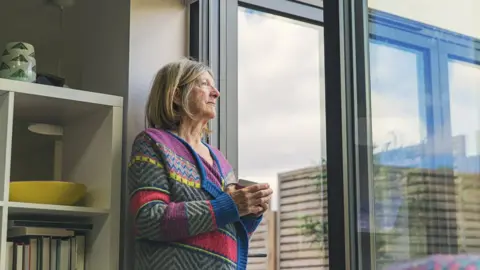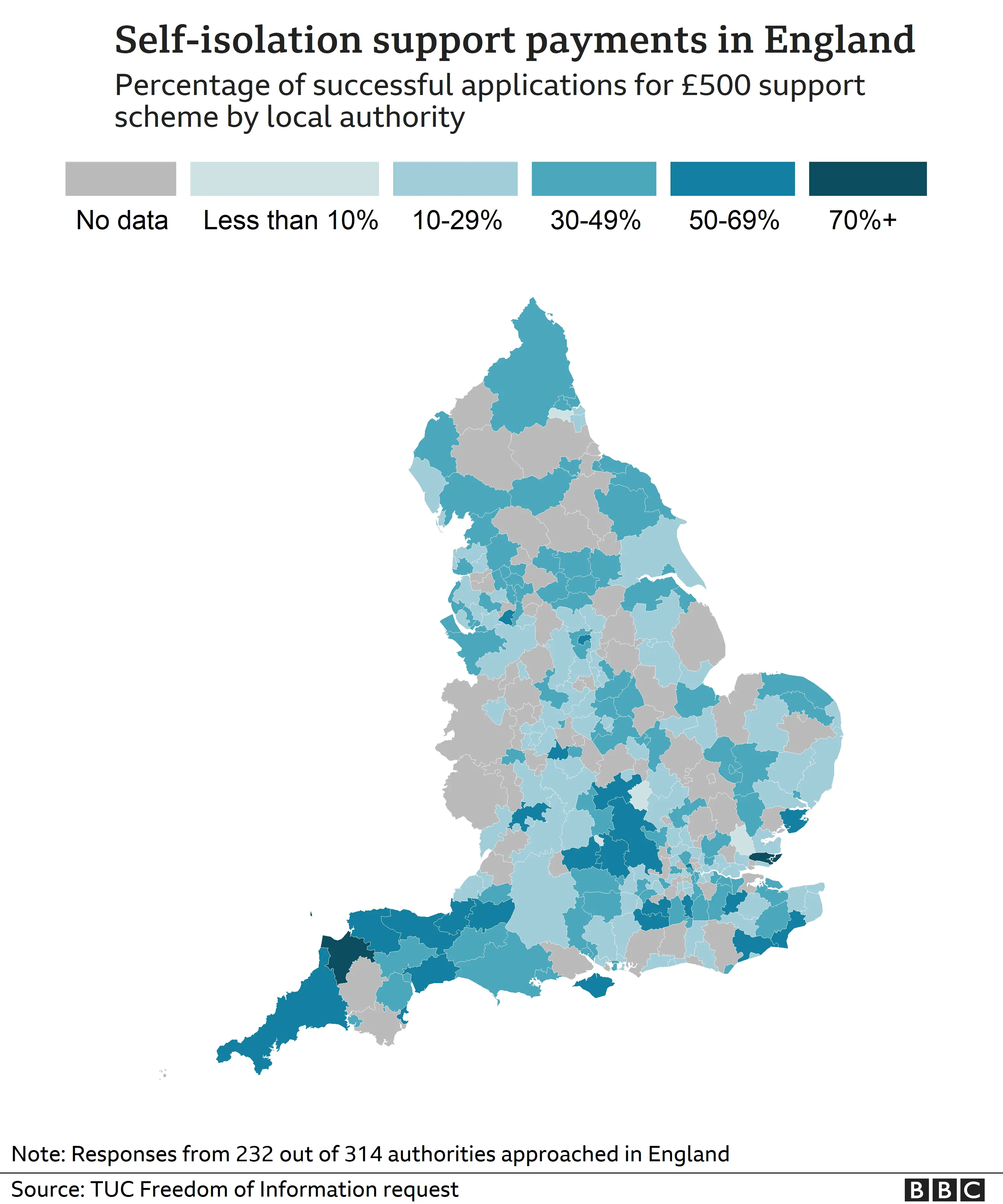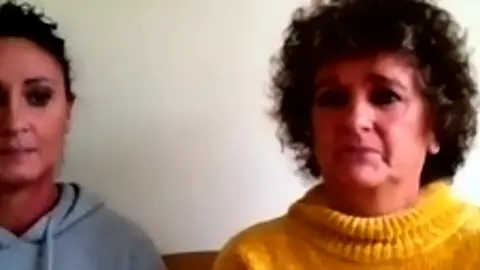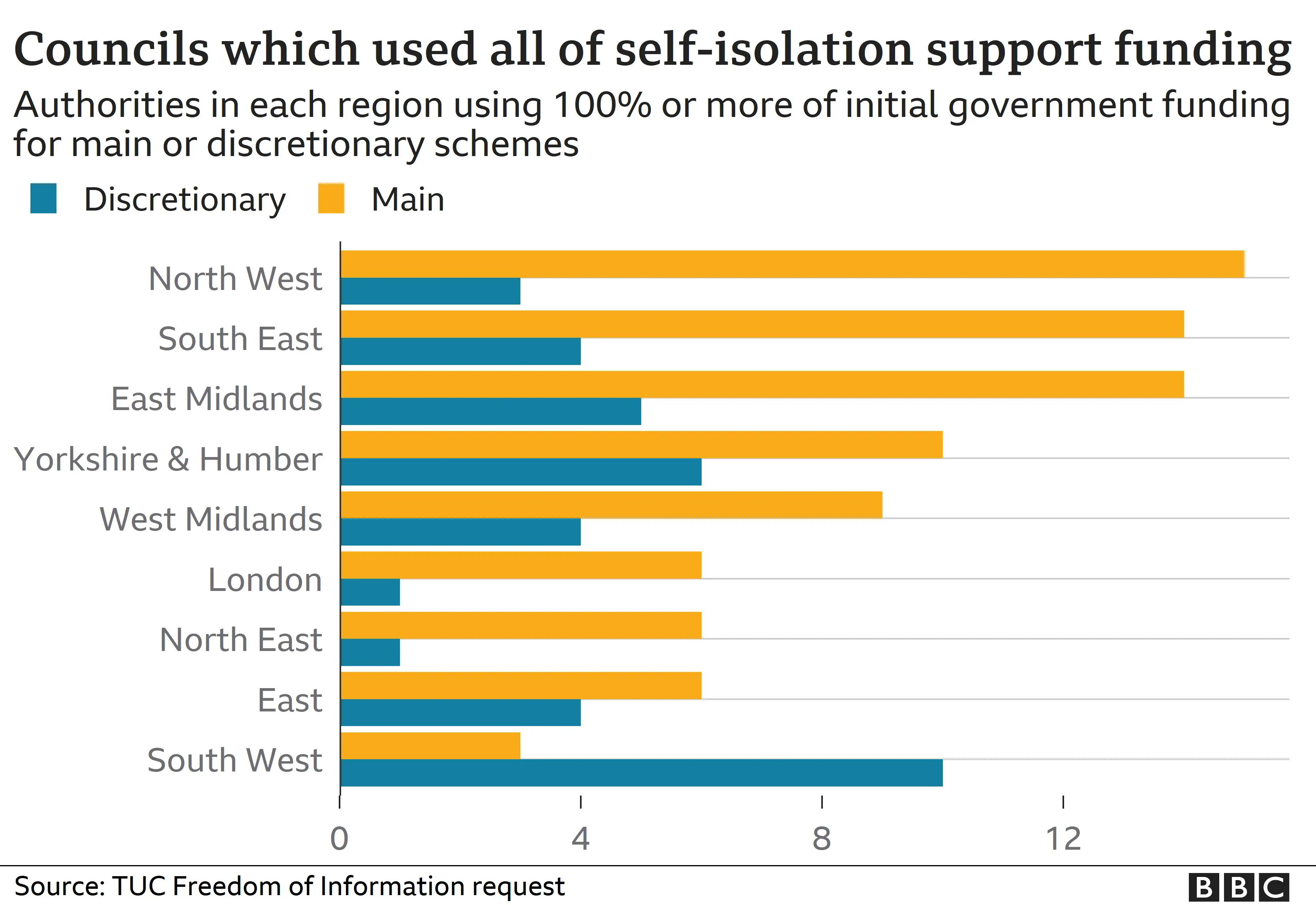Covid-19: Self-isolation support 'not working' in England, unions say
 Getty Images
Getty Images"Patchy" financial support for people self-isolating in England has left many workers in hardship, unions have said.
Figures suggest about 70% of applications for a £500 government support scheme were rejected as of 6 January.
The Trades Union Congress (TUC) has called for statutory sick pay to be increased and made available to all workers.
The government said it was "monitoring the effectiveness" of the support.
Councils in England are responsible for processing applications for the NHS Test and Trace Support Scheme, with money allocated from central government.
Figures obtained by the TUC suggest about 58,000 applications were successful out of about 190,000 in England - with large variations across the country.
Overall, 232 authorities out of 314 responded to the organisation's Freedom of Information request.

Some councils such as Rochford in Essex and Torridge in Devon granted more than 70% of applications, while Oxford City Council granted fewer than 10%.
The TUC said this suggested a "postcode lottery" existed within the scheme.
Susan Brown, leader of Oxford Council, said the authority had become "increasingly concerned" with the high number of rejected application to the main fund, saying the criteria were "very restrictive".
"A high number of people we think could benefit from this payment are not eligible, and so are having to be turned down," she added.

What is the scheme?
If a person tests positive for coronavirus or is asked to self-isolate for another reason, they can apply for a £500 support payment via one of the scheme's two funds.
Applicants must meet certain criteria to be eligible.
The main fund is available for people who are unable to work from home and are receiving a form of benefits.
The discretionary fund is available for those not receiving benefits but who will suffer financially by self-isolating.

'Let down'
Domiciliary carer Jan Simons, from Blaby in Leicestershire, caught coronavirus in November, and was living on £95 a week statutory sick pay while self-isolating.

The 64-year-old was refused any form of support payment because she was not on benefits and because she had just been paid and had £900 in her bank account.
Speaking to BBC Newsnight, she said: "I [felt] let down because I love my job, and I think I do a good job... but I was just turned down [for the payment] and that was it."
Her daughter, Ria Spilling, said help for her mother, "a key worker on the front line" during the pandemic, "just wasn't there".
'Thought I'd done my part'
Sam Griffiths, from Leeds, was initially turned down for the support payment, causing the musician, who also works in a pub, to become anxious and depressed.

"It was heartbreaking," he told BBC Newsnight. "Everything that could have gone wrong felt like it was going wrong."
The council refused the 28-year-old's application after saying his bank statements proved he had not been self-isolating, when actually he had been ordering food to be delivered to his home.
"I was furious because I thought I'd done my part by staying inside," he added.
Leeds City Council apologised for the error and Mr Griffiths later received the payment.
The TUC also asked how much of their initial funding for the scheme councils had used.
Of the councils running the main scheme, for those receiving benefits, 36% used all allocated funding, with some spending over - though this will be reimbursed by the government.

Blackburn with Darwen Council spent about £327,000 on the main scheme - more than triple its initial funding of £86,000 - after granting three quarters of applications.
A spokeswoman for the council said the high percentage of families receiving benefits had increased eligibility for the scheme.
Many councils running the discretionary scheme also spent more than their initial grant, with 17% exceeding it.
Hull City Council spent more than four times its initial £100,000 fund by granting fewer than half of applicants the £500 payment.
A spokesman for the council said it saw a high number of claims, due to many residents being in employment which did not provide income when self-isolating.
He added the council had taken a "pragmatic approach" by not introducing additional eligibility criteria - which would reduce costs but make the process longer and more difficult for applicants.
'Not working'
Frances O'Grady, general secretary of the TUC, said the current system of "patchy" self-isolation payments was "not working" and the scheme faced a funding shortfall, causing some councils to be conservative with funds when considering applications.
"Too many low-paid workers are going without the financial support they need to self-isolate," she said.
"This is a gaping hole in the UK's public health approach."
The TUC has instead recommended statutory sick pay, available for people too ill to work, be raised from the current £95.85 per week to "at least the real living wage" - about £330 per week.
Since the period covered in the TUC's request, the government has provided an additional £20m to local authorities to cover the cost of the scheme, including £10m for the discretionary scheme - bringing the total funding up to £70m.
A Department of Health and Social Care spokesman said the government was working with councils in England to monitor the scheme, including any impact on groups who were currently ineligible for it.
"The government will be providing further funding for the scheme in the coming months," he added.

- LOCKDOWN RULES: What are they and when will they end?
- SCHOOLS: When will they reopen?
- VACCINE: When will I get the jab?
- NEW VARIANTS: How worried should we be?

